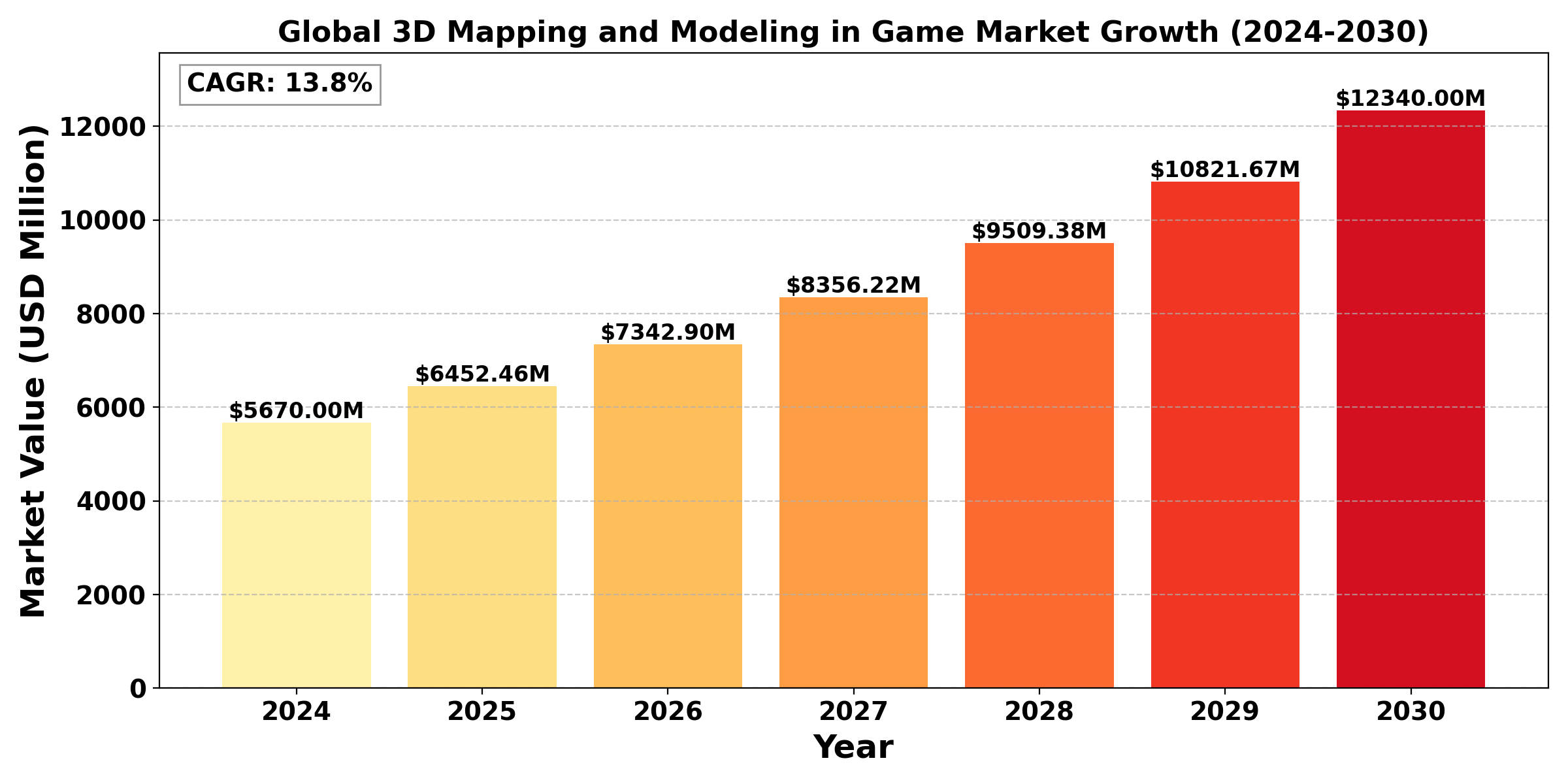The "Global 3D Mapping and Modeling in Game Market" size was valued at US$ 5.67 billion in 2024 and is projected to reach US$ 12.34 billion by 2030, at a CAGR of 13.8% during the forecast period 2024-2030.
The "United States 3D Mapping and Modeling in Game Market" size was valued at US$ 1.70 billion in 2024 and is projected to reach US$ 3.58 billion by 2030, at a CAGR of 13.2% during the forecast period 2024-2030.
3D Mapping and Modeling in Games involves creating detailed, three-dimensional environments and objects that enhance the visual realism and immersion of digital games. This process includes designing landscapes, buildings, characters, and items that players interact with, using tools like Blender, Autodesk Maya, and Unity. Techniques such as photogrammetry, procedural generation, and texture mapping are often used to create lifelike details and dynamic worlds. By incorporating 3D mapping, game developers can simulate realistic lighting, physics, and spatial relationships, providing players with a more engaging and authentic experience. This technology is fundamental in genres like open-world, adventure, simulation, and VR gaming.
Technologies and software tools used for creating three-dimensional environments, characters, and objects in video games.
Rapid growth driven by increasing demand for high-quality, immersive gaming experiences. Rising adoption of virtual reality and augmented reality in gaming. Development of AI-assisted 3D modeling tools and procedural generation techniques for game content creation.

Report Overview
3D mapping technology is one of the fastest ways to build 3D environments in the market nowadays. 3D mapping solution swiftly builds 3D maps of the surroundings with utmost accuracy and clarity, ready to plug into professional visualization systems. 3D modeling is the process of developing a 3D surface of an object via specialized software which can be can be displayed through computer simulation.
This report provides a deep insight into the global 3D Mapping and Modeling in Game market covering all its essential aspects. This ranges from a macro overview of the market to micro details of the market size, competitive landscape, development trend, niche market, key market drivers and challenges, SWOT analysis, value chain analysis, etc.
The analysis helps the reader to shape the competition within the industries and strategies for the competitive environment to enhance the potential profit. Furthermore, it provides a simple framework for evaluating and accessing the position of the business organization. The report structure also focuses on the competitive landscape of the Global 3D Mapping and Modeling in Game Market, this report introduces in detail the market share, market performance, product situation, operation situation, etc. of the main players, which helps the readers in the industry to identify the main competitors and deeply understand the competition pattern of the market.
In a word, this report is a must-read for industry players, investors, researchers, consultants, business strategists, and all those who have any kind of stake or are planning to foray into the 3D Mapping and Modeling in Game market in any manner.
Global 3D Mapping and Modeling in Game Market: Market Segmentation Analysis
The research report includes specific segments by region (country), manufacturers, Type, and Application. Market segmentation creates subsets of a market based on product type, end-user or application, Geographic, and other factors. By understanding the market segments, the decision-maker can leverage this targeting in the product, sales, and marketing strategies. Market segments can power your product development cycles by informing how you create product offerings for different segments.
Key Company
Chapter Outline
Chapter 1 mainly introduces the statistical scope of the report, market division standards, and market research methods.
Chapter 2 is an executive summary of different market segments (by region, product type, application, etc), including the market size of each market segment, future development potential, and so on. It offers a high-level view of the current state of the 3D Mapping and Modeling in Game Market and its likely evolution in the short to mid-term, and long term.
Chapter 3 makes a detailed analysis of the market's competitive landscape of the market and provides the market share, capacity, output, price, latest development plan, merger, and acquisition information of the main manufacturers in the market.
Chapter 4 is the analysis of the whole market industrial chain, including the upstream and downstream of the industry, as well as Porter's five forces analysis.
Chapter 5 introduces the latest developments of the market, the driving factors and restrictive factors of the market, the challenges and risks faced by manufacturers in the industry, and the analysis of relevant policies in the industry.
Chapter 6 provides the analysis of various market segments according to product types, covering the market size and development potential of each market segment, to help readers find the blue ocean market in different market segments.
Chapter 7 provides the analysis of various market segments according to application, covering the market size and development potential of each market segment, to help readers find the blue ocean market in different downstream markets.
Chapter 8 provides a quantitative analysis of the market size and development potential of each region and its main countries and introduces the market development, future development prospects, market space, and capacity of each country in the world.
Chapter 9 introduces the basic situation of the main companies in the market in detail, including product sales revenue, sales volume, price, gross profit margin, market share, product introduction, recent development, etc.
Chapter 10 provides a quantitative analysis of the market size and development potential of each region in the next five years.
Chapter 11 provides a quantitative analysis of the market size and development potential of each market segment (product type and application) in the next five years.
Chapter 12 is the main points and conclusions of the report.
Frequently Asked Questions ?
